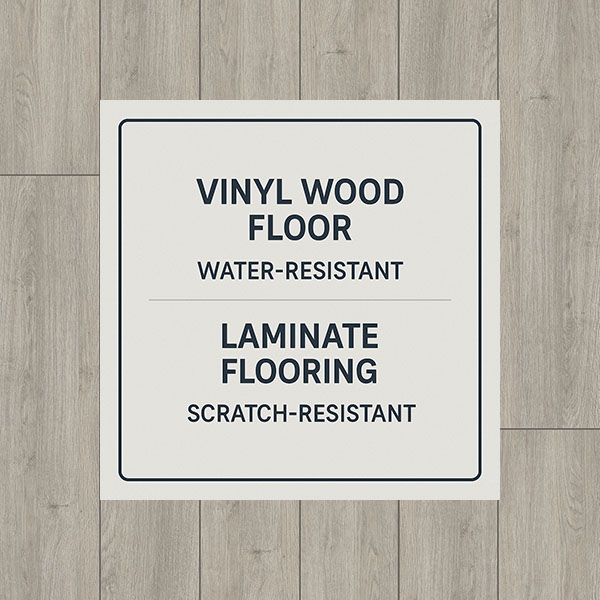Vinyl Wood Floor vs Laminate: Which Flooring Solution Is Best for South African Homes?
When comparing vinyl wood floor vs laminate, homeowners are often torn between water resistance, durability, cost, and aesthetics. Both flooring options have advanced over the years and now offer realistic wood looks at affordable prices. This guide explains the pros, cons, and key differences of each, helping you choose the best flooring solution for your lifestyle. For more detail, explore our laminate flooring and laminated floors sections.
Understanding Vinyl Wood Flooring
Vinyl wood flooring, also called luxury vinyl plank (LVP), is a resilient option designed to mimic real timber. With multi-layer construction, including a protective top layer, it resists scratches, stains, and heavy traffic. Its standout feature is exceptional water resistance, making it perfect for kitchens, bathrooms, and basements. With a wide variety of styles and textures, vinyl wood floors give you the warmth of wood without the maintenance challenges.
Understanding Laminate Flooring
Laminate flooring is built from a high-density fibreboard (HDF) core, a photographic wood-look layer, and a protective coating. Known for its scratch resistance and affordability, laminate is ideal for living rooms, bedrooms, and offices. Installation is quick thanks to click-and-lock systems, making it a favourite for cost-conscious homeowners who still want a stylish finish.
Vinyl Wood Floor vs Laminate: Key Differences
| Feature | Vinyl Wood Floor | Laminate Flooring |
|---|---|---|
| Moisture Resistance | 100% water-resistant, ideal for kitchens & bathrooms | Moisture-sensitive, best for dry areas |
| Durability | Highly resistant to scratches, dents, and stains | Scratch-resistant, less water-resistant |
| Installation | DIY-friendly click-lock or glue-down options | Click-lock floating installation, very fast |
| Cost Range | From budget-friendly to luxury premium | Generally more affordable overall |
| Aesthetic Realism | Improved realism with wood-like texture | High-resolution photographic detail |

Pros and Cons of Vinyl Wood Flooring
Pros: 100% water-resistant, ideal for high-traffic and moisture-prone areas, realistic designs, and easy DIY installation.
Cons: May dent under heavy objects, more difficult to repair if planks get damaged.
Pros and Cons of Laminate Flooring
Pros: Affordable, scratch-resistant, easy to clean, realistic photographic finishes, and quick installation.
Cons: Susceptible to swelling if exposed to water, can chip or dent if heavy objects fall on it.
Cost Comparison: Vinyl vs Laminate
Both floors are budget-friendly, but laminate is usually cheaper. Vinyl’s cost varies more widely, with luxury vinyl planks at the higher end. For South Africans, our laminate flooring price guide gives accurate insights into cost-per-square-metre and installation expenses. Remember to factor in accessories like scotia, underlay, and trims.
Durability and Maintenance
Vinyl wood flooring excels in moisture-prone zones thanks to its PVC-based layers, while laminate thrives in dry spaces where scratches are a bigger concern. Both are low-maintenance, needing only sweeping and damp mopping. However, vinyl handles spills better, while laminate requires extra caution against excess water.
Aesthetic Appeal
Modern vinyl offers realistic grain textures and embossed finishes, while laminate delivers crisp photographic detail. Both mimic hardwood and stone beautifully, making them excellent wood-look flooring alternatives. Ultimately, it’s a matter of personal style preference.
Which Is Right for Your Home?
Choose vinyl wood floors if water resistance is your top priority, especially for kitchens, bathrooms, and basements. Select laminate floors if you need scratch resistance, quick installation, and affordable elegance in living rooms and bedrooms. Visit our homepage to learn more about both options and find the perfect fit for your home.
Frequently Asked Questions
Is vinyl wood flooring better than laminate?
Neither is strictly better; it depends on your needs. Vinyl is ideal for moisture-prone areas, while laminate is more scratch-resistant and budget-friendly.
Which lasts longer: vinyl or laminate?
Both last 15–25 years with care. Vinyl generally performs better in wet areas, while laminate excels in dry, high-traffic rooms.
What is the cost difference between vinyl wood floors and laminate?
Laminate is usually more affordable upfront. Vinyl varies widely, with budget and luxury options available. Check our price guide for details.
Which is easier to install: vinyl or laminate?
Both feature click-and-lock systems for easy floating installations. DIY homeowners often find laminate slightly quicker to install, while vinyl provides more flexibility in moisture-prone areas.
For more expert advice, visit our laminate flooring and laminated floors sections to compare styles, specifications, and prices tailored to South African homes.

Leave a Reply